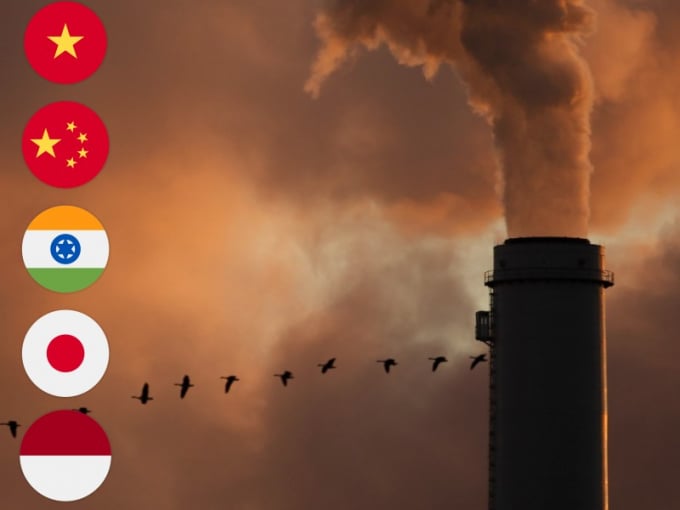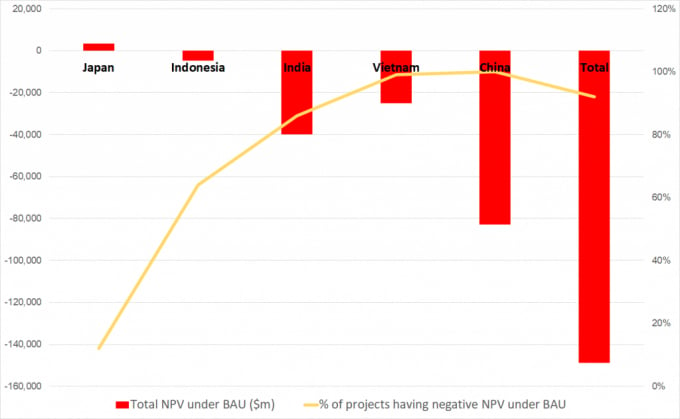December 11, 2025 | 09:17 GMT +7
December 11, 2025 | 09:17 GMT +7
Hotline: 0913.378.918
December 11, 2025 | 09:17 GMT +7
Hotline: 0913.378.918

Cutting coal generation in Asian countries crucial to climate change. Photo: TWN
The latest report from Carbon Tracker reveals a future in which the investment in coal power plants is deemed economically and environmentally unviable, and five Asian countries are poised to suffer great economic losses with their plans to hang on to dirty energy.
The COVID-19 pandemic and the cheaper renewables might have contributed to a 4-percent decline in coal power generation in 2020, but energy-related carbon emissions are projected to rebound this year, mainly driven by coal consumption in Asia, according to the report.
Carbon Tracker, a financial think tank specializing in the analysis of the impact of energy transitions, predicted that the universal goal of countering temperature rise through cutting coal generation depends almost entirely on developments in China, India, and ASEAN countries, which account for around 75 percent of global coal capacity and 80 percent of new coal-related projects.
To offer a clear outlook on the risk of investing in coal energy, Carbon Tracker includes operating profits, debt financing obligations, and tax expenses while evaluating over 600 projects that are over 30 gigawatts (GW) across five Asian countries — China, Vietnam, Indonesia, Japan, India. The projects are evaluated under the business-as-usual scenario (BAU) as well as the beyond two degrees scenario (B2DS), in which constraints exist when operating coal assets.
The research found 92 percent of projects would have a net present value (NPV), and new projects are at risk of providing value destruction of around US$150 billion under BAU. As in unregulated markets where market forces will drive the closure of unprofitable plants, 100 percent of coal projects in Japan and Vietnam, 89 percent in Indonesia, and 93 percent in India, risk creating an even higher negative NPV under the B2DS.

Data sourse: Carbon Tracker
At the same time, the existing coal plants are losing economic ground as renewables become increasingly affordable, given that the price of solar panels has fallen from US$106 per watt in 1976 to US$0.38 in 2019. Based on current pollution regulations and climate policies, 77 percent of the running coal facilities are more expensive than renewables and will rise to 98% by 2026 and 99% by 2030, when the renewable capacity reaches 2,100 GW.
The think tank suggested that the public recognize that when facing the cost competitiveness of renewable energy, investment in coal is highly risky and financially unsustainable. On the other hand, governments should place more emphasis on their post-pandemic stimulus plans on establishing infrastructure so that renewables can compete fairly with traditional energy.
As for the trend in which countries are shifting from coal to liquified natural gas, the researchers argued it would drive up the electric prices and not help in the meeting of climate targets. Adopting renewables has been proven to be not only the cheapest but also the most commercially and environmentally-friendly choice.
(TWN)

(VAN) Initiative launched in Cairo honors villages that are helping drive agrifood systems transformation.

(VAN) The European Union agreed Wednesday to phase out Russian natural gas imports by late 2027 as part of an effort to end the bloc’s decade-long dependency on Russian energy.

(VAN) Indonesia plans a US$1.2 billion investment in feed mills to boost poultry feed production.

(VAN) Japan's average retail rice price hit a new record high for the first time in three weeks, according to agriculture ministry data.

(VAN) The use of antibiotics in treating livestock in the UK has fallen, according to a new report released by the government’s Veterinary Medicines Directorate.

(VAN) Newly designated initiatives in Australia, Canada and South Africa represent science-based and inclusive examples of ecosystem restoration.

(VAN) Rice-based food has been selected as Japan's 'Dish of the Year' for 2025, reflecting public interest in the stable supply of the country's staple food amid a recent rice shortage.